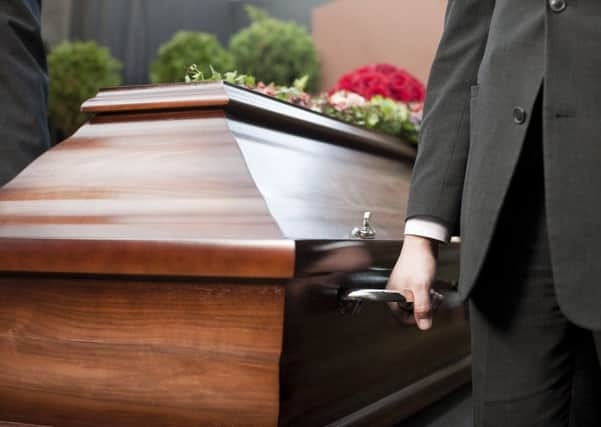Jeff Salway: Buried in debt by the bill for a funeral


The financial burden on grieving families struggling to meet funeral costs needs to be addressed “urgently” after two new reports showed a further acceleration in price increases in Scotland. The cost of burials and cremations is a “major problem”, Citizens Advice Scotland (CAS) has warned after revealing that burial fees alone have increased by eight per cent in the last 12 months.
Its latest Cost of Saying Goodbye study, which details the prices of burials and cremations in Scotland, revealed that all but three of Scotland’s 32 local authorities have raised their charges over the last year.
Advertisement
Hide AdAdvertisement
Hide AdMeanwhile the annual Cost of Dying report from SunLife found that the overall cost of a funeral in Scotland – including death-related costs such as headstones and flowers – is now more than £3,700, up 3.4 per cent from a year ago. It said funeral expenses are now the fastest rising fixed cost in the UK, with increases outstripping those in rent, food, utilities and clothing.
Funeral costs across the UK have now risen for 12 successive years, according to the insurer, which estimates that by 2021 the average funeral will cost £4,779.
The cost of paying for a funeral in Scotland still varies hugely depending on where you live. The difference between basic burial charges in Edinburgh, the most expensive area, and Western Isles, the least expensive, is now more than £1,500, said CAS.
Fraser Sutherland, spokesman for CAS, said: “Costs levied by local authorities can increase for a number of reasons; some have made substantial investment in new crematoriums or graveyards while others have looked to reduce current subsidies as a result of tighter budgets.”
Cremations are far more affordable than burials, at an average charge of £670. But those fees are rising rapidly too, with an 11 per cent increase in the last year.
“In some areas of Scotland only a private crematorium is available with fees being on average 15 per cent more at a private crematorium than a local authority run one,” said Sutherland.
“The additional burden of costs such as funeral directors expenses, a wake and flowers make this a significant expense for many low-income families, especially if the bereavement is sudden.”
But while funeral costs are increasing, the financial support available to grieving families is not.
Advertisement
Hide AdAdvertisement
Hide AdThe maximum award from the means-tested social fund funeral payment, which aims to help cover burial/cremation fees and other funeral expenses, has since 2003 been frozen at £700.
The Scottish Government has pledged to “work with the funeral sector and stakeholders to address the costs of funerals and other recommendations made in the report of the Scottish Working Group on Funeral Poverty”. The Working Group’s detailed report, published earlier this year, called for the UK government to increase the “other costs” element of the funeral payment and urged greater parity in local authority charges in Scotland.
It also proposed a Scottish funeral bond to help more people save for their own funeral and asked the Law Society of Scotland to look at the problems faced by families needing to withdraw cash savings that are under a lawyer’s control.
But action is needed quickly as the financial burden on bereaved families continues to grow. The number of people going to their local Citizens Advice Bureau because they’re struggling with funeral costs has risen by 83 per cent in just four years, according to Sutherland.
“Burial and cremation charges are a major problem and need to be addressed urgently,” he said.
“We have been working with Scottish Government ministers on their forthcoming Funeral Costs plan and will continue to work with other campaign groups to highlight these issues and campaign for change.”
The need to cover funeral expenses is pushing more and more families into debt, or exacerbating existing financial problems. One in seven families is left with an average shortfall of more than £2,300, according to SunLife. It found that 49 per cent of people are making either too little or no provision to pay for their own funerals, leaving their friends and family to cover the bill.
“This is causing very real problems, with more than a quarter forced to borrow to cover it and one in ten even resorting to selling belongings,” said Graham Jones, director at SunLife.
“Our research shows how important it is to talk about and plan for our funeral because if we don’t make plans we put a significant financial and emotional burden on the people we leave behind.”